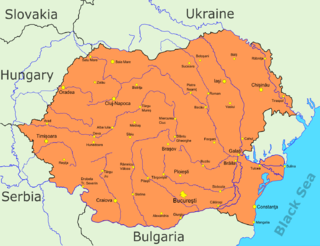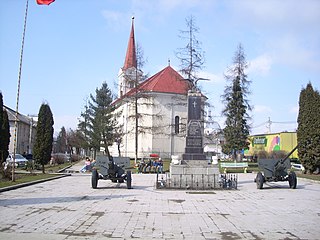
The Palace of the Parliament, also known as the House of the Republic or People's House/People's Palace, is the seat of the Parliament of Romania, located atop Dealul Spirii in Bucharest, the national capital. The Palace reaches a height of 84 m (276 ft), has a floor area of 365,000 m2 (3,930,000 sq ft) and a volume of 2,550,000 m3 (90,000,000 cu ft). The Palace of the Parliament is one of the heaviest buildings in the world, weighing about 4,098,500 tonnes, also being the second largest administrative building in the world. (The Great Pyramid of Giza at about 5.75 million tons is about 40% heavier.) The building was designed and supervised by chief architect Anca Petrescu, with a team of approximately 700 architects, and constructed over a period of 13 years (1984–97) in modernist Neoclassical architectural forms and styles, with socialist realism in mind. The Palace was ordered by Nicolae Ceaușescu (1918–1989), the president of Communist Romania and the second of two long-ruling heads of state in the country since World War II, during a period in which the personality cult of political worship and adoration increased considerably for him and his family.

The unification of Moldova and Romania is a popular concept in the two countries that began during the Revolutions of 1989. The Romanian Revolution in 1989 and the independence of Moldova in 1991 further contributed to the development of a movement for the unification of the two Romanian-speaking countries. The question of reunification is recurrent in the public sphere of the two countries, often as a speculation, both as a goal and a danger. Though historically Romanian support for unification was high, a March 2022 survey following the Russian invasion of Ukraine indicated that only 11% of Romania's population supports an immediate union, while over 42% think it is not the right moment.

Târgu Lăpuș is a town in Maramureș County, northern Transylvania, Romania. It administers thirteen villages: Boiereni (Boérfalva), Borcut (Borkút), Cufoaia (Kohópatak), Dămăcușeni (Domokos), Dobricu Lăpușului (Láposdebrek), Dumbrava (Kisdebrecen), Fântânele, Groape (Groppa), Inău (Ünőmező), Răzoare (Macskamező), Rogoz (Rogoz), Rohia (Rohi), and Stoiceni (Sztojkafalva).
Ioan Viorel Ganea is a Romanian football manager and striker for Liga IV Sibiu club A.S. Fotbal Club Dumbrăveni.

Immigration to Romania is less common than immigration to most other European Union countries, with Romania having 3.6% of the population foreign born as of 2021. Among immigrants, the most common countries of birth were Republic of Moldova (40%), Italy (11%) and Spain (9%). About two thirds of the foreign born population consists of labour migrants.

Dorin Chirtoacă is a Moldovan politician who served as Mayor of Chișinău from 2007 to 2018. He has been leader of Liberal Party (PL) since 2018.

Radu-Anton Câmpeanu was a Romanian politician who was also jurist and economist by profession, after graduating from the University of Bucharest (UB) in November 1945, specializing in constitutional right. During the interwar period and up until 1945, he was the leader of the National Liberal students' association at nationwide level.

Magdalena-Anca Mircea, better known by her stage name Mădălina Manole, was a Romanian pop recording artist.
Călin Georgescu is a Romanian senior expert in sustainable development, with an acknowledged recognition in the field, following 17 years of service in the environmental area in the United Nations system. Georgescu was appointed the executive director of the United Nations Global Sustainable Index Institute in Geneva and Vaduz for the period 2015–2016. Prior to that, he served as President of the European Research Centre for the Club of Rome (2013–2015). He is also member of the Club of Rome International in Switzerland.

Claudiu Mihail Teohari, known professionally as Teo, is a Romanian stand up-comedian, writer and occasional actor. After rising to fame in his native Romania as a household name in Bucharest's Deko Café, he was catapulted to internet fame by a series of YouTube recordings of his routines that went viral. As an actor, he made a cameo appearance in Dan Chișu's 2010 directorial debut, WebSiteStory.

Ioan Niculae is a Romanian businessman, best known for his ownership of InterAgro and the Astra Giurgiu football club. In August 2018, his net worth was estimated at $700 million.
The Fourth Ponta Cabinet was the government of Romania from 17 December 2014 to 17 November 2015. The Cabinet was supported by the Social Democratic Party (PSD), the National Union for the Progress of Romania (UNPR) and the Alliance of Liberals and Democrats (ALDE), the alliance forged by Călin Popescu-Tăriceanu's Liberal Reformist Party (PLR) and Daniel Constantin's Conservative Party (PC). Fourteen of the ministerial portfolios were held by PSD members, three by ALDE, two by UNPR and two by independent members.
The following lists events that happened during 2015 in Romania.

There were numerous protests against the Romanian Government between 2017 and 2019. In January 2017, days after the government of the Grindeanu Cabinet was sworn into office in Romania, protests took place throughout the country against ordinance bills that were proposed by the Romanian Ministry of Justice regarding the pardoning of certain committed crimes, and the amendment of the Penal Code of Romania. At the heart of these protests is the community Corruption Kills, founded by Florin Bădiță, who alongside other civic groups organized what proved to be the largest protests since 1989, thus realizing the "Revolution of our generation".

Presidential elections were held in Romania on 10 November 2019, with a second round held on 24 November 2019. They were the eighth presidential elections held in post-1989 Romania. Incumbent President of Romania Klaus Iohannis, first elected in 2014, was eligible for re-election. He subsequently defeated former Prime Minister and ex-leader of the Social Democratic Party (PSD) Viorica Dăncilă in the second round of the election by a landslide, receiving 66 percent of the vote – the second-highest vote share on record in this type of elections after Ion Iliescu.

The Party of Liberty, Unity and Solidarity was a pro-European, liberal political party established on 26 October 2018, whose president was Dacian Cioloș, former Prime Minister of Romania from 2015 until 2017, elected on 26 January 2019. The party had its origin in the Movement Romania Together (MRÎ), a project which they gave up due to the setting up delay in court. The party merged in 2021 with the Save Romania Union (USR) with which it has been in a political alliance called 2020 USR-PLUS Alliance from 2019 to 2021, then formally activating as a sole, unified party known as USR PLUS.

Survivor România is a Romanian reality game show based on the international Survivor format. The season premiered on 18 January 2020 on Kanal D.

Presidential elections will be held in Romania in either mid- or late November 2024, with an eventual second round to be held in late November or early December 2024 as well. They will be the ninth presidential elections held in post-1989 Romania. As the Romanian Constitution allows a maximum of two presidential terms, incumbent President of Romania Klaus Iohannis, first elected in 2014 and then re-elected in 2019, is not eligible for re-election. His second term will normally end in December 2024.
Events from the year 1947 in Romania. The year saw the abdication of Michael I of Romania and foundation of the Romanian People's Republic.

Events from the year 1950 in Romania. The year saw Romania build relationships with other Communist states, including China and East Germany.
















